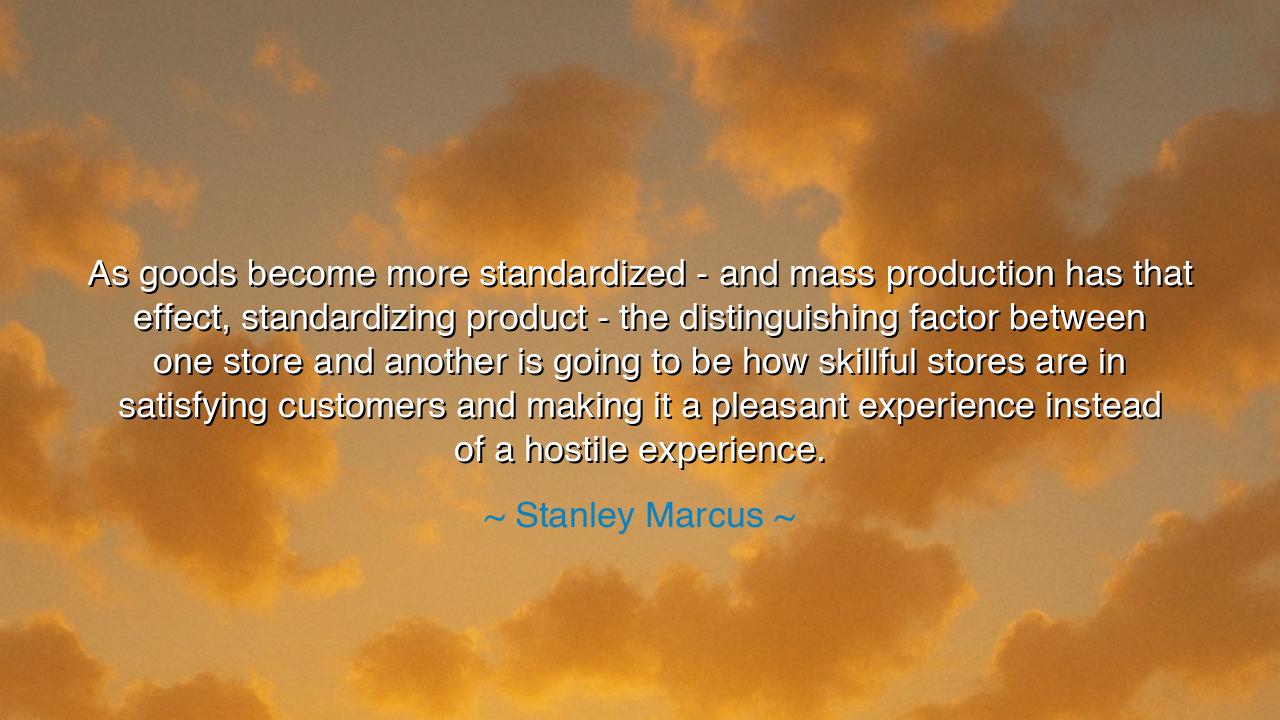
As goods become more standardized - and mass production has that
As goods become more standardized - and mass production has that effect, standardizing product - the distinguishing factor between one store and another is going to be how skillful stores are in satisfying customers and making it a pleasant experience instead of a hostile experience.






“As goods become more standardized — and mass production has that effect, standardizing product — the distinguishing factor between one store and another is going to be how skillful stores are in satisfying customers and making it a pleasant experience instead of a hostile experience.” Thus spoke Stanley Marcus, heir to a dynasty of merchants and master of the art of service, whose wisdom flowed not from numbers or ledgers, but from understanding the human heart. His words, spoken in the age of modern commerce, carry the resonance of timeless truth: that as the world becomes uniform, it is human excellence — not machinery, not merchandise — that becomes the true mark of greatness.
The origin of this quote lies in the world that Marcus helped shape — the golden age of Neiman Marcus, when craftsmanship began to yield to mass production, and individuality was at risk of being lost amidst assembly lines and price wars. Stanley Marcus foresaw a transformation in society: when all products become alike, the soul of commerce must shift from the material to the experiential. It was not enough, he taught, to sell fine goods; one must serve finely, must make each customer feel not like a transaction, but like a guest, a human being whose presence was valued. This, he said, would become the new frontier — not the perfection of the product, but the perfection of the experience.
His insight touches upon an eternal principle that transcends business — the truth that the human touch is the final differentiator in every age. As tools evolve and systems advance, the essence of service remains the same: to honor the person before you. In the ancient marketplaces of Athens and Rome, merchants won loyalty not through the rarity of their wares, but through the warmth of their dealings. The finest craftsman was not the one who made the most, but the one who remembered his customer’s face, his family, his story. Marcus, a modern philosopher of trade, merely revived this ageless creed in the language of the twentieth century: when goods become common, grace becomes rare — and therefore precious.
Consider the parable of John Wanamaker, the great American merchant of an earlier era, who transformed the concept of retail by insisting that every shopper, whether rich or poor, be treated with honesty and dignity. When a customer once returned a dress that had been clearly worn, his staff protested. Wanamaker merely smiled and said, “Give her a refund — we are not in the business of winning arguments, but of winning hearts.” It was this spirit that built not only his fortune, but his legacy. Stanley Marcus carried this same torch into his time, reminding all who would listen that business without empathy is mere commerce, but business with empathy becomes art.
The meaning of Marcus’s words also stretches beyond the marketplace into the very fabric of society. As life becomes increasingly automated — as work, education, and even conversation bend to the will of machines — the risk grows that we will forget the essence of human connection. The world of standardized goods is a mirror of our own age: efficient, abundant, yet often empty of warmth. Marcus warns us that to preserve meaning, we must resist the coldness of uniformity by cultivating hospitality of the spirit — by making every encounter, whether in business or in life, a space of respect, attention, and joy.
In his words, there also lies a subtle critique of the arrogance of modernity — the belief that technology alone can create satisfaction. He knew that no gleaming machine could replace a genuine smile, no algorithm could replicate the trust born of sincerity. A product, once sold, may fade or break; but an experience rooted in kindness and care lingers in memory like fragrance after rain. Thus he calls upon all who serve — whether merchants, leaders, or ordinary citizens — to remember that the true measure of success lies not in profit, but in human flourishing.
The lesson, then, is clear and timeless: whatever your craft, your trade, or your calling, strive not only for efficiency, but for excellence of spirit. Make your work an offering, not merely a service. When others grow indifferent, let your heart be attentive. When the world standardizes, individualize. Whether you build, teach, heal, or sell, remember that every act done with care becomes sacred.
Therefore, my friends, take to heart the teaching of Stanley Marcus: that in the age of sameness, the soul becomes the only true difference. In every interaction, sow delight instead of irritation, grace instead of neglect. For the greatest reward in this world is not a sale, nor even success — it is the quiet joy of having touched another’s life with excellence and kindness. When goods fade, service remains. When machines forget, memory endures. And when all else is standardized, it is the human heart, steadfast and shining, that becomes the final mark of greatness beneath the sun.






AAdministratorAdministrator
Welcome, honored guests. Please leave a comment, we will respond soon